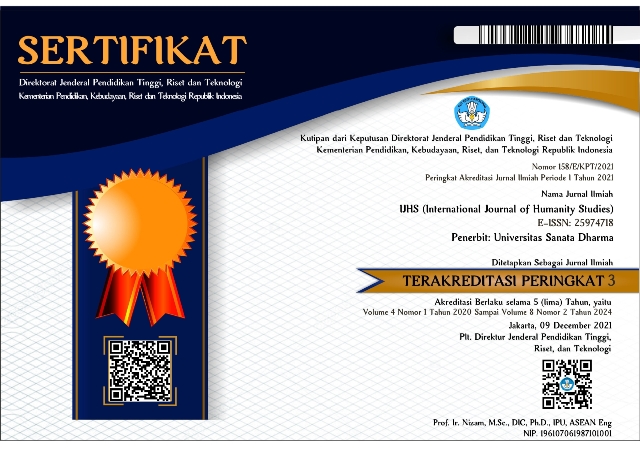SOCIAL AND ENVIRONMENTAL INJUSTICE IN MORTAL ENGINES (2018) FILM: A STUDY OF POSTCOLONIAL ECOCRITICISM
(1) Universitas Islam Negeri Syarif Hidayatullah Jakarta, Indonesia
(2) Universitas Islam Negeri Syarif Hidayatullah Jakarta, Indonesia
(*) Corresponding Author
Abstract
Keywords
Full Text:
PDFReferences
Anggraini, A. E. (2019). Posmodernisme dan Poskolonialisme dalam Karya Sastra. Pujangga: Jurnal Bahasa Dan Sastra, 4(1), 59–70. https://doi.org/10.47313/pujangga.v4i1.500
Ashcroft, B., Griffiths, G., & Tiffin, H. (2013). Post-colonial studies: The key concepts. Routledge.https://doi.org/10.4324/978023777855
Bertens, H. (2017). Literary theory: The basics. Routledge.
Bogdan, R., & Biklen, S. K. (1998). Qualitative research for education. Boston: Allyn and Bacon, Inc.
Bordwell, D., Thompson, K., & Smith, J. (2017). Film art: An introduction. McGraw-hill education New York.
Buell, L. (2011). Ecocriticism: Some emerging trends. Qui Parle: Critical Humanities and Social Sciences, 19(2), 87–115. https://doi.org/10.5250/quiparle.19.2.0087
Cloete, A. L. (2017). Film as medium for meaning making: A practical theological reflection. HTS Theological Studies, 73(4), 1–6. http://dx.doi.org/10.4102/hts.v73i4.4753
Corbin, J., & Strauss, A. (2014). Basics of qualitative research: Techniques and procedures for developing grounded theory. Sage Publications.
DeLoughrey, E. & Handley, G. B. (2011). Postcolonial ecologies: Literatures of the environment. OUP USA.
Glissant, É. (1997). Poetics of relation. University of Michigan Press.
Huggan, G., & Tiffin, H. (2007). Green postcolonialism. Interventions: International Journal of Postcolonial Studies, 9(1), 1–11. https://doi.org/10.1080/13698010601173783
Huggan, G., & Tiffin, H. (2015). Postcolonial ecocriticism: Literature, animals, environment. Routledge.
Lathrop, G., & Sutton, D. O. (2014). Elements of mise-en-scene. Retrieved on January, 3, 2023 from https://blogs.baruch.cuny.edu/latinxscreens/files/2021/
02/Elements-of-mise-en-scene-G.-Lathrop-and-D.-Sutton.pdf.
McQuail, D. (2010). McQuail’s mass communication theory. London: Sage Publications.
Miller, J. (2012). Postcolonial Ecocriticism and Victorian Studies. Literature Compass, 9(7), 476–488. https://doi.org/10.1111/j.1741-4113.2012.00891.x
Nixon, R. (2005). Environmentalism and postcolonialism. In Postcolonial Studies and beyond (pp. 233–251). Duke University Press.
Nurhadi. (2007). Postkolonial: Sebuah Pembahasan. Seminar Rumpun Sastra FBS UNY, 1–19.
Piliang, Y. A., & Jaelani, J. (2018a). Teori Budaya Kontemporer: Penjelajahan Tanda dan Makna. Yogyakarta: Penerbit Cantrik Pustaka.
Piliang, Y. A., & Jaelani, J. (2018b). Teori Budaya Kontemporer: Penjelajahan Tanda dan Makna. Yogyakarta: Aurora.
Pramaggiore, M., & Wallis, T. (2008). Film: A Critical Introduction (2. Baskı). Londra: Laurence King.
Rivers, C. (2018). Mortal Engines. Universal Pictures.
Sugiyono, P. (2005). Memahami penelitian kualitatif. Bandung: Alfabeta.
Thwaites, T., Davis, L., & Mules, W. (2018). Introducing cultural and media studies: a semiotic approach. Bloomsbury Publishing.
Vivanco, L. A. (2002). Seeing green: Knowing and saving the environment on film. American Anthropologist, 104(4), 1195–1204. https://doi.org/10.1525/aa.2002.104.4.1195
Wenzel, J. (2011). 6 Forest fictions and ecological crises: Reading the politics of survival in Mahasweta Devi’s “Dhowli”. Postcolonial Ecologies: Literatures of the Environment, 136-156. https://doi.org/10.1093/acprof:osobl/9780195394429.003.0007
DOI: https://doi.org/10.24071/ijhs.v8i1.7004
Refbacks
- There are currently no refbacks.
Copyright (c) 2024 Muhamad Ramadan Saputra, Inayatul Chusna

This work is licensed under a Creative Commons Attribution-ShareAlike 4.0 International License.
Indexed and abstracted in:
IJHS Sinta 3 Certificate (S3 = Level 3)
International Journal of Humanity Studies (IJHS) has been nationally accredited Sinta 3 by the Ministry of Education, Culture, Research and Technology of the Republic of Indonesia based on the decree No. Surat Keputusan 158/E/KPT/2021. Validity for 5 years: Vol 4 No 1, 2020 till Vol 8 No 2, 2024

This work is licensed under CC BY-SA.
Creative Commons Attribution-ShareAlike 4.0 International License.
p-ISSN: 2597-470X (since 31 August 2017); e-ISSN: 2597-4718 (since 31 August 2017)
Notice: The opinions expressed in this publication are those of the authors. They do not purport to reflect the opinions or views of the editorial team or publishers.
International Journal of Humanity Studies (IJHS) is a scientific journal in English published twice a year, namely in September and March, by Sanata Dharma University, Yogyakarta, Indonesia.


















